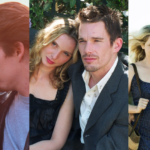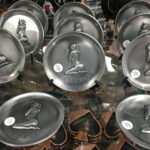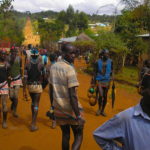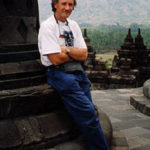Rachel Louise Snyder is the author of Fugitive Denim: A Moving Story of People and Pants in the Borderless World of Global Trade, the novel What We’ve Lost is Nothing, and No Visible Bruises: What We Don’t Know About Domestic Violence Can Kill Us. Over the last decade, Snyder has been an outspoken journalist on issues of domestic violence and her work has appeared in the New Yorker, the New York Times magazine, Slate, Salon, the Washington Post, the Huffington Post, the Chicago Tribune, the New Republic, and others. No Visible Bruises was awarded the 2018 Lukas Work-in-Progress Award from the Columbia School of Journalism and Harvard’s Nieman Foundation. Over the past two decades, Snyder has traveled to more than fifty countries, covering stories of human rights, natural disasters and war. She lived, for six years, in Phnom Penh, Cambodia before relocating to Washington, DC in 2009. Originally from Chicago, Snyder holds a B.A. from North Central College and an M.F.A. from Emerson College. She is currently an Associate Professor of Creative Writing and Journalism at American University in Washington, DC.
How did you get started traveling?
The first time i left the States was when I was 23 and I went on Semester at Sea. My first foreign country was Japan, which is incredibly, beautifully, profoundly foreign. In fact, my very first night in my very first foreign country, I was caught in a typhoon and had to spend the night at the Kobe train station. My most stunning memory from that night is how incredibly safe it was. Imagine spending a night in a train station in any major city in the US and feeling safe. Another day, in Kyoto, I walked right into a Japanese family’s house because I thought it was a restaurant (which was next door). If you’ve been to Kyoto you’ll understand how easy it was to do this. I remember this Japanese woman looking at me with great curiosity and I looked at her and we just sort of stared at each other for a minute. Then I mimed eating and she walked me next door. She’s probably still telling that story.
How did you get started writing?
In a way, it’s the family business. My grandfather was a writer — a journalist and a poet. His twin brother, my great uncle, was the creator of the original Addam’s Family. And my great uncle’s son (my cousin), with whom I am very close, is a wonderful poet in L.A. I have books I wrote when I was eight and nine years old. I only ever wanted to be a writer. As a teenager, I wrote incredibly sappy rhyming poetry and believe it or not, I have all those poems collected in a giant binder. I honestly don’t think I was ever very good at anything else. I’ve been fired from more jobs than most people will hold in their lifetimes.
What do you consider your first “break” as a writer?
Having a grandfather for a writer. He told me to always carry a pencil and paper and I did — I do. He carried one of those tiny golf pencils in his shirt pocket. So I watched a writer in the real world. But beyond that, my real break came in my final semester of graduate school. I was getting my MFA in fiction from Emerson College and I took a nonfiction class on a whim, with the poet John Skoyles. John encouraged me to send an essay I’d written for his class to Mademoiselle magazine and they printed it. I got an agent from that essay and believe it or not, I have the same agent still today, 24 years later. Wait. Twenty-four? Can that be right? (Note: I just did the math three times. Indeed. It’s right).
As a traveler and fact/story gatherer, what is your biggest challenge on the road?
That’s changed over the years. I think, having lived overseas now (first in London, then in Phnom Penh), I am hyper-sensitive to dropping into a new place or culture and thinking I understand something about it when I maybe don’t. I try to read as much as I can before I go now, and I’ve traveled so much and for so many years now that I have this endless string of connections — as do most travelers. The more you hurl yourself out into the world, the more you realize how small it is. I think for me, I have to continually keep myself from internalizing sentiments like, “Oh. This is just like X place or X place, when people do X or X” and to remember to find what’s unique in a place. Vietnam and Thailand might share a lot of things, for example — religions, foods — but they are vastly different places, even if they might appear more like than different at first glance. I need to remind myself to find the differences, not just the similarities. I think this actually gets more challenging the more you travel, not less.
What is your biggest challenge in the research and writing process?
Organization and structure. They are probably every nonfiction writer’s challenge. But I think what’s also difficult, especially with the work I”m doing now — primarily around domestic violence and domestic violence homicide — is that it’s easy to just endlessly research. At some point, you have to stop researching and write. I researched my most recent book for eight or nine years, and then one day realized I was using the research as a way to avoid the emotional burden of actually writing the book. Once I realized this, I sat down and I wrote it in about five months. For a lot of people, starting is the hardest part. I play a trick on myself now that I kind of say, “Right. Wherever you start isn’t the actual real start. It’s just the beginning.” The difference is crucial, and frees you of the burden to know what you’re doing at the outset.
What is your biggest challenge from a business standpoint?
God. Keeping receipts. And taxes! Who is allowing these tax rules to change every year (oh. right. politicians). Making ends meet was always my biggest challenge in the early days. I’d set a goal for every trip and it was very systematic. So, for example, when I first went to Vietnam and Cambodia in 1996, my goal was to make the cost of the trip back and I’d budgeted $3000 for that trip (which was about six weeks). My next big trip was to Nepal, Tibet and Dharamshala, India. The goal for that trip was expenses plus 50%. Each different trip in those days had a common geography or theme. Nowadays, I am a professor with a regular salary which — not gonna lie — is a huge relief. I spent the first forty years of my life absolutely, distressingly broke. The past decade has been a marvel.
Have you ever done other work to make ends meet?
What haven’t I done? I’ve: sold newspaper subscriptions door to door, detassled corn, waitressed (endless waitressing; I actually quite enjoy it), installed cable TV in hotel rooms, booked rock bands, rehabbed antique furniture, cleaned apartments, managed apartment buildings, filed insurance documents, sold insurance, washed dishes and bussed tables at a Mexican restaurant, hostessed, sold pots and pans door to door, cashiered at a gas station, worked phones at a rental car agency, and on and on. I’ve also taught adjunct. All those jobs were kind of amazing though. When I got more serious about my writing, after grad school, I hit a point in 2002 or so when I was just not making enough money to make ends meet in Chicago, where I lived. I despaired over what to do. I didn’t have a book yet, or any kind of speciality. The Internet, you might remember, was a boon for writers like me in the mid to late 90s — Salon, Slate, they all came about then and they used to actually pay. But by 2002, that had begun to dry up. I thought about going into international development. I thought about getting a PhD. I really, really thought about quitting writing. And then I realized, after months of hard thinking, that I could maybe love those other things, but I would never love them as much as I loved writing. So I moved to Cambodia, and stayed there for six years.
What travel authors or books might you recommend and/or have influenced you?
I was never really interested in what I imagined as travel writing. I mean, don’t get me wrong, I loved Bruce Chatwin, for example. But I was more interested in the people and their struggles in any given area, particularly women. And everything I’ve ever done as a nonfiction writer has been a kind of social issue or social justice. So in this way, my bigger influences are literary journalists, rather than pure travel writers, I think. In college, and in my early days, Studs Terkel and James Baldwin were really my biggest influences. Or people who might go somewhere to write something, but the place takes a lesser stage than the issue being covered… Ted Conover was a big influence early on. And Adrian Nicole LeBlanc, Sara Davidson, Barbara Ehrenreich. These days, Sonia Nazario and Rachel Kaazdi Ghansah. In fact, I think Rachel Kaazdi Ghansah is the most gifted nonfiction writer working today; I will take to the streets to defend this assertion!
What advice would you give to someone who is considering going into travel writing?
I would say to look at these as separate entities (unless you’re going to be okay sticking to writing about new resorts opening up, which no one sets out to do). Traveling and writing. Think of what sets you aflame and then think of where you might go to cover that. Maybe you’re really into sports, for example — something I know very little about. Sports are such an important way in to understanding a culture, or speaking a kind of universal language. Or fashion. I once went to a fashion show at midnight in the desert outside of Niamey, Niger. It was astounding. It had camels and everything, and it had to be at night, because it was too hot during the day. I was in Niger covering a different story entirely, but that would have been an incredible event to witness for someone better versed than me in the subtleties. Maybe you’re an environmentalist. Certainly, there are enough stories around the globe to keep that interest aflame for decades to come. So I’d consider the interest first, and let the geographies come later.
What is the biggest reward of life as a travel writer?
When I was trying to make my living as a freelancer, I remember just being exhausted by having to come up with more and more ideas. My rejection to acceptance ratio was something like fourteen ideas for every acceptance. Nowadays, I have editors coming to me with ideas. It was really a shock the first time this happened. And it’s awesome, but it also has taught me something: that the best ideas for my writing actually come from me anyway. That crushing ratio turned out to be excellent training. Oh, and here’s the other thing: those of us who are recognized for our writing? We didn’t get that recognition the first time we trotted ourselves and our work into the world. It took years. In my case, of course, approximately twenty-four. There’s nothing special about my writing, or about what I did; I just didn’t give up.





